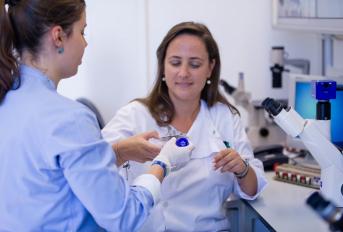Associação Portuguesa de Investigação em Cancro
Expression of receptor activator of NFkB (RANK) drives stemness and resistance to therapy in ER+HER2- breast cancer
Expression of receptor activator of NFkB (RANK) drives stemness and resistance to therapy in ER+HER2- breast cancer

Authors and Afilliations:
Inês Gomes1, Bernardo P. de Almeida2,4, Sara Dâmaso3, André Mansinho1,3, Inês Correia1, Sara Henriques1, Raquel Cruz-Duarte1, Guilherme Vilhais1, Pedro Félix1, Patrícia Alves1, Patrícia Corredeira1, Nuno L. Barbosa-Morais2, Luis Costa1,3 and Sandra Casimiro1
1Luis Costa Laboratory, Instituto de Medicina Molecular, Faculdade de Medicina da Universidade de Lisboa, Lisboa, Portugal
2Nuno Morais Laboratory, Instituto de Medicina Molecular, Faculdade de Medicina da Universidade de Lisboa, Lisboa, Portugal
3Serviço de Oncologia, Hospital de Santa Maria-CHULN, Lisboa, Portugal
4Current affiliation: Research Institute of Molecular Pathology (IMP), Vienna Biocenter (VBC), Vienna, Austria
Abstract:
The role of RANKL-RANK pathway in progesterone-driven mammary carcinogenesis and triple negative breast cancer tumorigenesis has been well characterized. However, and despite evidences of the existence of RANK-positive hormone receptor (HR)- positive breast tumors, the implication of RANK expression in HR-positive breast cancers has not been addressed before. Here, we report that RANK pathway affects the expression of cell cycle regulators and decreases sensitivity to fulvestrant of estrogen receptor (ER)-positive (ER+)/HER2- breast cancer cells, MCF-7 and T47D. Moreover, RANK overexpressing cells had a staminal and mesenchymal phenotype, with decreased proliferation rate and decreased susceptibility to chemotherapy, but were more invasive in vivo. In silico analysis of the transcriptome of human breast tumors, confirmed the association between RANK expression and stem cell and mesenchymal markers in ER+HER2- tumors. Importantly, exposure of ER+HER2- cells to continuous RANK pathway activation by exogenous RANKL, in vitro and in vivo, induced a negative feedback effect, independent of RANK levels, leading to the downregulation of HR and increased resistance to hormone therapy. These results suggest that ER+HER2- RANK-positive cells may constitute an important reservoir of slow cycling, therapy-resistance cancer cells; and that RANK pathway activation is deleterious in all ER+HER2- breast cancer cells, independently of RANK levels.
Journal: Oncotarget
Link: https://www.oncotarget.com/article/27576/




